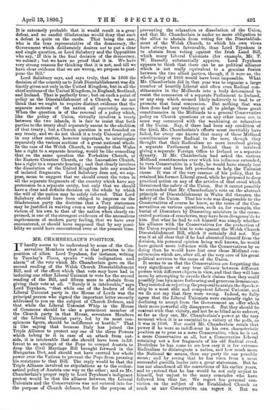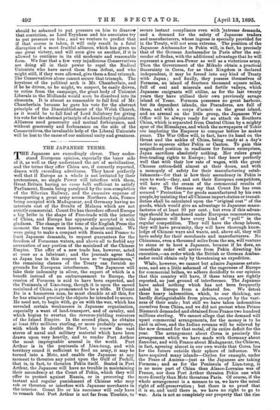MR. CHAMBERLAIN'S POSITION.
IT hardly seems to be understood by some of the Con- servative Members what it is that pertains to the position of allies. Lord Teynham, for instance, writing to Tuesday's Times, speaks " with indignation and alarm" of the vote which Mr. Chamberlain gave on the second reading of the Welsh Church Disestablishment Bill, and of the effect which that vote may have had in inducing one other Liberal Unionist to vote for the second reading of the Bill, and fifteen more to abstain from giving their vote at all. " Surely it is intolerable," says Lord Teynham, "that while one of the leaders of the Liberal Unionist party in the House of Lords was the principal person who signed the important letter recently addressed to you on the subject of Church Defence, and that while the Liberal Unionist Whip in the House of Commons should be also a prominent member of the Church party in that House, seventeen Members of the Liberal Unionist party, led by its most con- spicuous figure, should be indifferent or hostile." That is like saying that because Italy has joined the Triple Alliance to protect any one of the three Powers which belong to it in case of an attack from out- side, it is intolerable that she should have been indif- ferent to an attempt of the Pope to compel Austria to drop the Civil Marriage Bill brought forward in the Hungarian Diet, and should not have exerted her whole power over the Vatican to prevent the Pope from pressing his resistance to that Bill. The reply would be that the Triple Alliance involved no stipulations as to the ecclesi- astical policy of Austria one way or the other ; and so Mr. Chamberlain's proper reply to Lord Teynham's indignant protest would be that the alliance between the Liberal Unionists and the Conservatives was not entered into for the purpose of Church defence, but for the purpose of preventing the relaxation or dissolution of the Union, and that Mr. Chamberlain is under no more obligation to the allies to abstain from voting for the Disestablish- ment of the Welsh Church, to which his own views have always been favourable, than Lord Teynham is to abstain from voting against the Irish Land Bill, which many Liberal Unionists (for example, Mr. T. W. Russell) substantially approve. Lord Teynham appears to think that there can be no political alliance which is not really equivalent to a genuine fusion between the two allied parties, though, if it were so, the whole policy of 1886 would have been impossible. What Mr. Chamberlain did in that year was to organise a large number of heartily Liberal and often even Radical con- stituencies in the Midlands into a body determined to resist the concession of a separate Parliament to Ireland, or any step which seemed likely indirectly to lead to or promote that fatal concession. But nothing that was then done had any tendency at all to pledge these great constituencies in the Midlands to a general Conservative policy on Church questions or on any other issue not in some way connected with the weakening or relaxation of the Union. Nay, if there had been any condition of the kind, Mr. Chamberlain's efforts must inevitably have failed, for every one knows that many of these Midland constituencies were Radical to the core, though they thought that their Radicalism no more involved giving a separate Parliament to Ireland than it involved giving a separate Foreign Office to Ireland or a separate dynasty. If Mr. Chamberlain had asked the various Midland constituencies over which his influence extended, to turn Conservative in a body, he would have simply lost his labour and been left powerless to help the Unionist cause. It was of the very essence of his policy, that he retained his former Liberalcreed, while he proposed to drop practical action on any of Vie articles of that creed which threatened the safety of the Union. But it cannot possibly be contended that Mr. Chamberlain's vote on the abstract principle of Disestablishment in Wales did threaten the safety of the Union. That his vote was disagreeable to the Conservatives of course he knew, as the votes of the Con- servatives on various questions, such as, for example, the burial of Dissenters by Dissenting ministers in the conse- crated portions of cemeteries, may have been disagreeable to him. But what he had to ask himself was simply whether his alliance with the Conservatives for the protection of the Union required him to vote against the Welsh Church Disestablishment Bill, which it certainly did not. Nor was it at all clear that if he had absented himself from the division, his personal opinion being well known, he would have gained more influence with the Conservatives by so doing than he would have lost over those Midland con- stituencies which are, after all, at the very core of his great political services to the cause of the Union.
It seems to us that the Conservatives are forgetting the very significance of any true alliance between different powers with different objects in view, and that they will lose more by attempting to overdo their claims than they could possibly lose by a more forbearing and generous demeanour. They insisted on rejecting theproposal to assign the Speaker- ship to a most able and competent Liberal Unionist, and we do not say that they were wrong. Indeed, we fully agree that the Liberal Unionists were eminently right in declining to accept from the Government an offer which their more powerful ally disapproved. But they should be content with that victory, and not be so blind as to subvert, so far as they can, Mr. Chamberlain's power at the very moment when it is as essential to a victory at the polls, as it was in 1886. Nor could Mr. Chamberlain retain that power if he were so indifferent to his own characteristic position as to pose as a mere Conservative, when he is not a mere Conservative at all, but a Conservative Liberal retaining not a few fragments of his old Radical creed. Doubtless he has come to see how easy it is for extreme Radicalism to disintegrate a nation, and how much more the National tie means, than any party tie can possibly mean ; and by seeing that he has risen from a most successful guerilla leader into a great statesman. But he has not abandoned all the convictions of his earlier years, and to pretend that he has would be not only unjust to himself, but unjust to the many comrades who have followed him thus far. We regret his personal con- viction on the subject of the Established Church as much as any Conservative can regret it. But we should be ashamed to put pressure on him to disavow that conviction, as Lord Teynham and his associates try to put pressure on him ; and we venture to predict that if that course is taken, it will only result in a fatal disruption of a most fruitful alliance, which has given us one great victory, and will soon give us another, if it is allowed to continue in its old moderate and reasonable form. We fear that a few very injudicious Conservatives are doing all in their power to repel the Radical Unionists who have saved them from defeat, and who might still, if they were allowed, give them a final triumph. The Conservatives alone cannot secure that triumph. The keystone of the political arch is Mr. Chamberlain, and if he be driven, as he might, we suspect, be easily driven, to retire from the campaign, the great body of Unionist Liberals in the Midlands would soon be dissolved into its elements. It is almost as reasonable to fall foul of Mr. Chamberlain because he gave his vote for the abstract principle of the Disestablishment of the Welsh Church, as it would be to fall foul of Lord Salisbury for giving his vote for the abstract principle of a hereditary legislature. Alliances need generosity and mutual forbearance, and without generosity and forbearance on the side of the Conservatives, the invaluable help of the Liberal Unionists will be lost to the cause of our national unity and greatness.



































 Previous page
Previous page